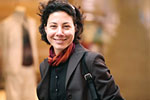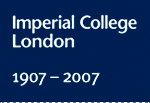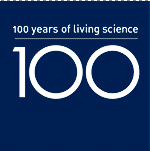Speaker Biographies
Prof Maria Petrou, FREng
Since September 2005 Prof Maria Petrou has held the Chair of Signal Processing at Imperial College London as head of the Communications and Signal Processing research group in the Department of Electrical and Electronic Engineering.
Prof Petrou studied Physics at the Aristotelion University of Thessaloniki, Greece, followed by Part III of the Mathematical Tripos and a PhD in Astronomy at University of Cambridge. She has worked in computer vision since 1986m, first at Reading University then as an Atlas Research Fellow of St. Hilda's College Oxford and the Rutherford Appleton Laboratory. From 1998 to 2005 she was Senior Lecturer, Reader then Professor of Image Analysis at the Department of Electronic & Electrical Engineering of Surrey University.
Prof Petrou's research interests include many topics on Image Processing, Computer Vision and Pattern Recognition, with applications in Biomedicine, Geoscience, Cognitive Vision, etc, as well as research in basic methodology.
Prof Petrou currently supervises the PhD research of Siti Mariam Shafie and Marasyiti Hanafi from Universiti Putra Malaysia through the Malaysia-Imperial Doctoral Programme.
Prof Hani Gabra PhD FRCPE FRCP
Prof Hani Gabra is Professor of Medical Oncology, Division of Surgery, Oncology, Reproductive Biology and Anaesthetics at Imperial College London's Faculty of Medicine. He is also theme leader for Imperial College's Cancer research theme, and Chief of Service, West London Gynaecological Cancer Centre based at the Hammersmith Hospital Campus.
Prof Gabra studied for his BSc at the University of Glasgow before completing and MSc and PhD at the University of Edinburgh, Scotland.
Prof Gabra is supervisor of Jacqueline Chee on the A*STAR-Imperial Partnership PhD programme in collaboration with Prof Sir David Lane at the Institute of Molecular and Cell Biology, A*STAR, and assistant supervisor for Nor Haslinda Abdul Aziz of Universiti Malaya through the Malaysia-Imperial Doctoral Programme.
Prof Steve Lin MD FRCS Dphil
Prof Lin holds the Chair in Paediatric Surgery at the Imperial College Faculty of Medicine's Division of Surgery, Oncology, Reproductive Biology and Anaesthetics (SORA). Prof Lin is based in the Department of Bio-surgery & Biotechnology closely linked with the Hammersmith Stem Cell Biology/Immunology teams at the Hammersmith Hospital Campus.
Prof Richard Kitney OBE, FREng, DSc (Eng), FCGI
Prof Kitney is Professor of Biomedical Systems Engineering in the Department of Bioengineering, Imperial College London. He is also Senior Dean of the College, and Director of the Graduate School of Engineering and Physical Science. He was the first Head of Department of the Department of Bioengineering and the Director of the Centre of Medical and Biological Systems. Prof. Kitney has published over 300 papers in the fields of biomedical signal and image processing, medical visualisation, medical informatics and the general application of computers to healthcare. He is founder, Deputy Chairman and Technical and Strategic Director of ComMedica Ltd, a medical IT company.
Prof Kitney has worked on the study of arterial disease, cardio-respiratory control, biomedical image processing related to magnetic resonance imaging and ultrasound, the development of Picture Archiving and Communications Systems (PACS), and 3D visualisation techniques. Professor Kitney has worked extensively in the United States and has been a Visiting Professor at MIT since 1991. He has received a number of awards from institutions around the world, and was awarded the Order of the British Empire (OBE) in the Queen's Birthday Honours List for services to Information Technology in Healthcare.
Prof Kitney is a member of the Academic Board of the Malaysia-Imperial Doctoral Programme, and of the Governing and Academic Board of the A*STAR-Imperial Partnership.
Dr Paul Langford
Dr Langford is a Reader in Pediatrics (Molecular Infectious Diseases), Division of Medicine in Imperial College London's Faculty of Medicine. He is based at the St Mary's Hospital Campus in Paddington, London. His research interests include the development of vaccines for bacterial meningitis and bacterial respiratory diseases of pigs as well as novel diagnostics of paediatric tuberculosis.
Dr Langford graduated from UWIST (now part of Cardiff University) with a BSc Applied Biology, and received a PhD from the University of Aston for his work investigating alternatives to animal experimentation. He did postdoctoral research in the Departments of Chemistry/Microbiology at The University of Bristol and the Department of Paediatrics, University of Oxford, before joining Imperial College London.
Dr Langford collaborates with Dr Martin Hibberd, of the A*STAR Genome Institute of Singapore, and Honorary Senior Lecturer at Imperial College London, to supervise the PhD of Hazel Wong through the A*STAR-Imperial Partnership.
Dr Jing Zhang
Dr Zhang holds the position of Reader in the Department of Physics, Imperial College London, having studied and worked in London since his undergraduate days. He was a member of the Phillips Research Laboratories, Redhill, during PhD and Postdoc periods.
He is one of over 100 members of the Experimental Solid State Physics group and the Centre for Electronic Materials and Devices, working on the epitaxial growth of semiconductor thin films using Molecular Beam Epitaxy and its variant Gas Source MBE. He teaches the undergraduate optoelectronic module of the Semiconductor Device Physics Course, and Semiconductor Growth and Structural Characterisation to first-year postgraduates.
Dr Zhang is supervisor to Chiam Sing Yang of the A*STAR Institute of Materials Research & Engineering through the A*STAR-Imperial Partnership.
Dr Michael Templeton
Dr Templeton holds a BASc in Engineering Science and a PhD in Civil-Environmental Engineering, both from the University of Toronto, Canada. His research focuses on engineering solutions for the protection of public health and environmental quality, especially in relation to water supply and treatment. His specific research interests include ultraviolet disinfection process design and optimisation, the occurrence and formation of toxic disinfection by-product compounds, emerging waterborne pathogens, computational modelling of treatment processes, distribution system water quality, and water supply/management in developing countries.
He teaches courses in water and wastewater engineering and urban hydrology/drainage, is the department's second year undergraduate coordinator, and the administrator of the annual PhD Seminar Series in the Environmental and Water Resources Engineering section.
Dr Templeton, alongside Prof Nigel Graham, supervises the PhD studies of Noor Aida Saad of Universiti Sains Malaysia, through the Malaysia-Imperial Doctoral Programme.
Dr David Larkman
Dr Larkman is Senior Lecturer in Medical Imaging at the Clinical Sciences Centre, Faculty of Medicine, Imperial College London. He earned his PhD studying magnetic systems in the Experimental Condensed Matter and Low Temperature group at the University of Manchester.
He is the main investigator for a physics based research programme focused on development of novel rapid imaging techniques and artefact correction algorithms based on data consistancy approaches. He is part of an inter-disciplinary research team (physics/engineering/clinical) whose interests include pediatric imaging, diffusion and perfusion imaging. Other MR research interests include arterial spin labeling, Imaging of cellular level phenomenon, the physics of micro-structured magnetically active rf materials and MR system computing architecture.
Dr Larkman works alongside Dr Xavier Golay, Head of the Laboratory of Molecular Imaging at A*STAR's Centre for Molecular Medicine, to supervise the PhD of Irvin Teh through the A*STAR-Imperial Partnership.
Dr John de Mello
Dr de Mello has been a lecturer in Nanomaterials in the Department of Chemistry, Imperial College London since 2000. He obtained his PhD in semiconducting polymers at Cambridge University in the group of Professor Richard Friend, then worked for two years as a Civil Servant in the Office of Science and Technology.
His primary research interests include: organic semiconductors and their use in LED's, photodiodes and chemical sensors; miniaturized devices for chemical and biological diagnostics; the preparation and characterisation of metal and compound semiconductor nanoparticles; and intelligent synthesis techniques for the controlled production of fine chemicals. Dr de Mello is on the editorial boards of Chemical Society Reviews and the Journal of Experimental Nanoscience. He has published 30 papers and 3 patents.
Dr de Mello supervises two current A*STAR-Imperial Partnership PhD students from the A*STAR Institute of Materials Research & Engineering, Ooi Zi En and Ong Kok Haw.
Dr Xavier Golay
Dr Golay is the Head of the Laboratory of Molecular Imaging (LMI), The LMI aims to develop a research programme organized around translational activities and seeks to set up a Magnetic Resonance Imaging (MRI) programme capable of providing physiological and functional information on animals that could be scaled easily onto human beings on clinical MRI units; and be a resource centre for the entire scientific community in Singapore.
Dr Golay did his undergraduate studies at the Swiss Federal Institute of Technology in Lausanne (EPFL) majoring in Physics Engineering, and received his Ph.D. from the Swiss Federal Institute of Technology in Zurich (ETHZ) in Physics in 1998. Dr. Golay has had working experience with Johns Hopkins University in Baltimore, MD, where he was first a Post-doctoral Fellow, then a Research Associate and Assistant Professor in the field of Magnetic Resonance Imaging (MRI) research. He moved in August 2003 to the National Neuroscience Institute of Singapore, where he built up a research unit within the Department of Neuroradiology.
Dr Alan Sellinger
Dr. Sellinger is Senior Scientist in the Molecular and Performance Materials Cluster of the A*STAR Institute of Materials Research and Engineering (IMRE), and Adjunct Associate Professor in the School of Physical & Mathematical Sciences, Nanyang Technological University. Dr Sellinger was awarded an MS and PhD in Macromolecular Science and Engineering from the University of Michigan after a B.S. in Chemistry at Eastern Michigan University.
His research interests focus on the synthesis of organic semiconductors for application in solar cells, transistors and light emitting diodes, and the nanocomposite thin films via evaporation induced self-assembly (EISA), with current work looking at organic/polymer electronics (with Prof. Ananth Dodabalapur through the Visiting Investigator Program), materials for application in organic solar cells, and light emitting diodes, and an organic solar cells project with BASF.
Dr Martin Lloyd Hibberd
Dr Hibberd is Group Leader and Associate Director of the Infectious Diseases research group at A*STAR's Genome Institute of Singapore. He is also currently Senior Adjunct Fellow in the Department of Microbiology, National University of Singapore, and Senior Lecturer in Infectious Diseases in the Department of Paediatrics, Imperial College London. He studied a BSc in Applied Biology at Brunel University, west London, and a PhD in Medicine from King's College London.
His work currently focuses on two aspects of infectious disease, understanding which infection causes the observed disease (including pathogen identification) and why specific individuals are susceptible to the disease (using host genetics). This work aims to identify key host responses to specific pathogens that could be targeted by new therapies.
Dr Chiam Keng Hwee
Dr Chiam is a Senior Research Engineer in the Large-Scale Complex Systems group at A*STAR's Insititute for High Performance Computing. His research interests include Biophysics: computational cancer mechanics - models of cell migration and deformation during cancer metastasis; systems biology: models of signal transduction and cytoskeletal remodelling; and fluid mechanics: biological fluid dynamics, microfluidic mixing, convection and thermal turbulence.
Dr Chiam received his BSE in Physics from the University of Michigan, and his PhD in Physics from the California Institute of Technology (CalTech)
© 2007 Imperial College London

Science and technology have the power to transform the world. Today’s complex challenges demand new approaches, fresh thinking and scientific innovation. Donate now to support research and education at Imperial.
Where your support can make a differenceGive now


